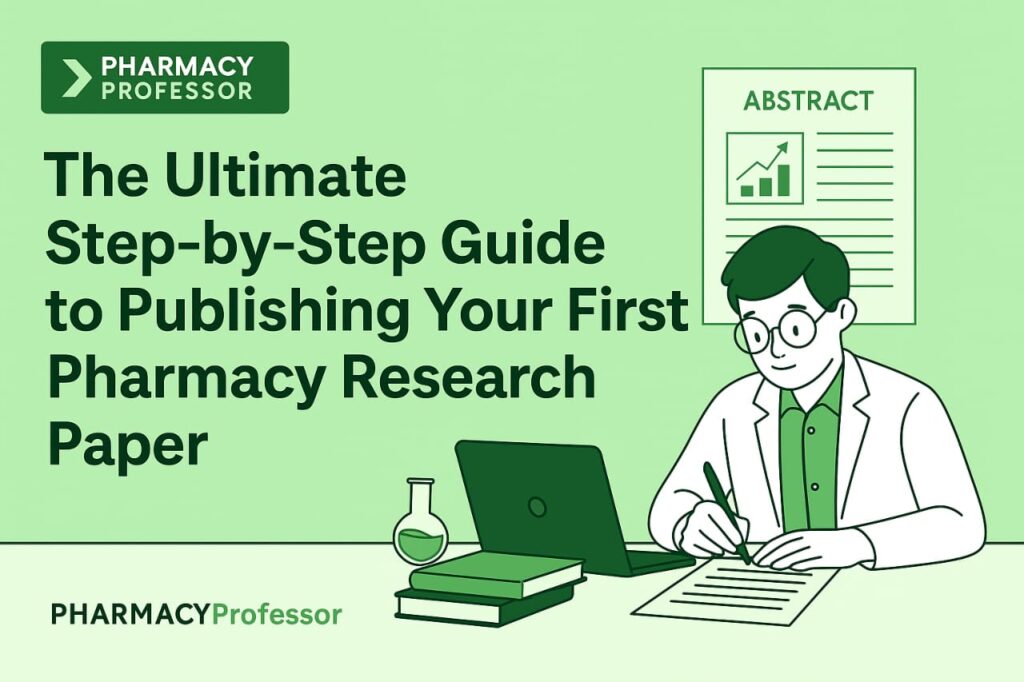Introduction
Publishing a research paper as a pharmacy student is a major academic milestone. Whether you’re studying B.Pharm, M.Pharm, or working as an intern, getting your work published enhances your academic portfolio, improves your GPAT and PhD opportunities, and strengthens your scientific credibility.
This complete guide will walk you through every part of the Pharmacy Research Paper Publication process — from topic selection to submission — using practical tools, journal tips, and expert strategies.

Choosing a Research-Worthy Topic
Select Your Area of Interest
Start by identifying the field you are passionate about. Popular pharmacy domains include:
- Pharmacology
- Pharmaceutics
- Pharmacognosy
- NDDS (Novel Drug Delivery Systems)
- Herbal Formulations
- Clinical Pharmacy
Ensure Novelty
Before writing, ensure your idea is original. Avoid copy-paste and check if similar research is already published.
- Discuss with your supervisor or guide
- Use platforms like PubMed, ScienceDirect, and Google Scholar to explore recent trends
- Focus on research gaps and practical problems
Choosing a new and meaningful topic is the first foundation of a successful Pharmacy Research Paper Publication.
Sample Research Topics
- Formulation of sustained-release tablets using natural polymers
- Development of herbal-based anti-inflammatory gels
Conducting a Literature Review
Where to Search
A detailed literature review supports your hypothesis and proves your work is relevant. Use:
- PubMed
- Scopus
- Google Scholar
- ResearchGate
- Mendeley or Zotero for reference management
What to Read
- Read at least 20–30 relevant papers
- Note what has already been done and where your idea fits
- Focus on unanswered questions in your field
This review strengthens your justification and helps streamline your Pharmacy Research Paper Publication process.
Writing the Research Manuscript
Standard Structure
Prepare your manuscript in this format:
- Title
- Abstract
- Introduction
- Materials and Methods
- Results and Discussion
- Conclusion
- References (APA or Vancouver style)
Writing clearly and scientifically is essential for smooth Pharmacy Research Paper Publication.
How to Write an Effective Abstract
Best Practices
Your abstract should summarize the entire paper in 150–250 words. It should include:
- The aim of your study
- Research methods
- Key findings
- Final conclusion and research implications
Avoid abbreviations, citations, and overly technical terms.
Sample Abstract
The present study aims to develop and evaluate a polyherbal transdermal patch for anti-inflammatory activity. Herbal extracts were incorporated into a polymeric base and assessed for physicochemical properties. In vitro release and anti-inflammatory activity were measured. The formulation showed sustained drug release with significant inhibition of inflammation. These findings suggest the potential of polyherbal transdermal patches in topical drug delivery.
Recommended Tools
- Grammarly
- QuillBot
- ChatGPT
- Hemingway App
A strong abstract increases acceptance chances during the Pharmacy Research Paper Publication process.
Checking for Plagiarism
Tools to Use
Ensure originality using these plagiarism checkers:
- Turnitin (via college login)
- Plagscan
- Scribbr
- SmallSEOTools
Keep your similarity index under 10%. Plagiarism is one of the top reasons for rejection in Pharmacy Research Paper Publication.
Selecting the Right Journal
Reputed Journals for Pharmacy Students
Choose UGC CARE or Scopus-indexed journals. Free-to-submit options include:
- Indian Journal of Pharmaceutical Sciences
- Journal of Young Pharmacists
- Research Journal of Pharmacy and Technology (RJPT)
- International Journal of Pharmaceutical Sciences and Research (IJPSR)
Selection Tools
Right journal selection increases the chance of successful Pharmacy Research Paper Publication.
Submission Process
How to Submit Your Paper
- Register on the journal’s official website
- Carefully follow their author guidelines
- Submit the manuscript in both Word and PDF format
- Include a cover letter if required
- Wait for an acknowledgment or decision email
Correct submission format is essential for any Pharmacy Research Paper Publication to proceed smoothly.
Responding to Rejection and Resubmission
Don’t Give Up
Rejections are normal. Here’s what to do:
- Read reviewer comments carefully
- Make improvements to methods, language, or figures
- Submit again to the same or another appropriate journal
Persistence is key in Pharmacy Research Paper Publication. Learn and revise confidently.
Practical Tips for Students
- Always get ethical approval for clinical or animal studies
- Add your guide or professor as co-author
- Never pay for fake journals with quick publication offers
- Maintain your raw data, analysis sheets, and reports
- You can also publish review articles and case studies
Following these strategies can ease your Pharmacy Research Paper Publication journey.
Useful Tools and Resources
- Zotero: https://www.zotero.org/
- Mendeley: https://www.mendeley.com/
- Grammarly: https://www.grammarly.com/
- Turnitin: https://www.turnitin.com/
- UGC CARE List: https://www.ugc.ac.in/journallist/
Frequently Asked Questions
Can B.Pharm students publish a research paper?
Yes, under proper guidance, they can publish review articles, case studies, or original research.
Is it necessary to pay for publishing?
No. Many reputed journals are free. Always verify authenticity before paying.
Which is better: Review or Original Research?
Both have their value. Start with a review article if you lack lab access or data.
How long does it take to get published?
Most journals take between 2 weeks to 3 months, depending on peer review speed.
Conclusion
Publishing your first research paper might seem difficult, but with proper planning, it is completely achievable. This guide simplifies the Pharmacy Research Paper Publication process for students at every level.
Whether it’s a review article or experimental study, your ideas deserve to be shared. Take the first step today and begin your Pharmacy Research Paper Publication journey with clarity and confidence.
For more pharmacy research guidance and related blog posts, visit:
👉 https://pharmacyprofessor.com/

